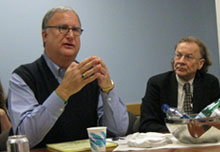
April 7, 2009 — Rick Kaplan kicked off his brown-bag talk, titled “The First 100 Days and the Press,” by seemingly minimizing the importance of the very thing he’d come to talk about. “There’s nothing magical about the first 100 days,” he said. “It’s a benchmark that journalists and writers have set up, because we always need to judge people.”
Kaplan, executive producer for CBS Evening News with Katie Couric, noted that originally a president’s first 100 days began not when he took the oath of office, but when Congress came into session. Why then? “Because there weren’t as many executive orders being delivered as you see now, and the president’s success was measured by how well he got along with Congress,” he said.
Now a president can have the greatest impact immediately after taking oath and before his own team is set — Obama has less than 50 percent of his appointees in place, and while that means fewer hands on the levers of government, it also means less infighting.
“A lot of the things [presidents] want to do long term and a lot of things they feel in their hearts show up in the first 100 days,” Kaplan said. For Bill Clinton that was gays in the military; for Obama it has been a list of things Kaplan called “extraordinary.” He also singled out the president’s performance at the recent G20 meeting.
The immense size and global nature of the current crisis make the role of the press even more difficult than usual. “I actually had to learn what derivatives where,” Kaplan joked. “This is really in-the-weeds, complicated stuff.” Journalists don’t always have the space or time to the go into the details, but they’re exactly what the public needs to know. That’s where the web can be a useful tool, allowing journalists to provide more information for those who want it, yet not slow things down for those who don’t.
A significant portion of Kaplan’s talk was spent addressing the current state of the media. A veteran of ABC News, MSNBC, and many other news organizations, Kaplan felt that the current economic climate had led to an increased responsibility in the media.
“These are serious times, and we can’t afford to get into that era when there was so much noise coming out of the press corps toward the president, or the president toward the press corps. We can’t afford that right now.”
This article was written by Leighton Walter Kille and the photos taken by Janell Sims, both of the Shorenstein Center.

